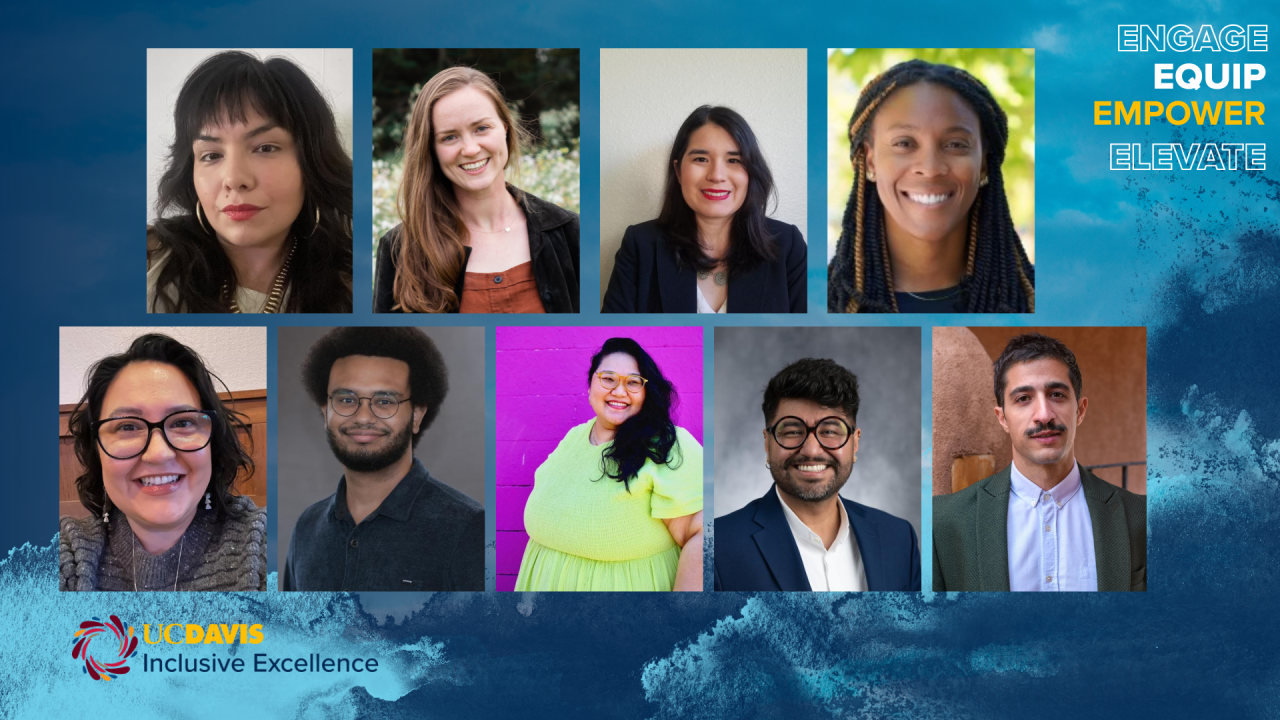
Meet the 2025 CAMPOS and CAMPSSAH Faculty Scholars
The Office of Advancing Mentoring and the Professoriate welcomes nine new UC Davis faculty into two programs that are integral to UC Davis’s commitment to inclusive excellence in scholarship and mentoring.
These nine faculty members will be officially inducted into the Center for the Advancement of Multicultural Perspectives on Science (CAMPOS), and the Center for the Advancement of Multicultural Perspectives on Social Sciences, Arts, and Humanities (CAMPSSAH) programs during a ceremony on November 5 at the Jan Shrem and Maria Manetti Shrem Museum of Art.
CAMPOS: 54 scholars, 11 years of impact
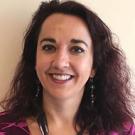
CAMPOS, led by Professor of Pathology and Laboratory Medicine Verónica Martínez-Cerdeño, emerged from a previous National Science Foundation ADVANCE grant to expand the presence of women and historically marginalized faculty in STEMM at UC Davis. With this year’s newest cohort, there are a total of 54 CAMPOS Faculty Scholars with appointments across 37 departments in eight colleges and schools.
CAMPSSAH: Great thinkers solving wicked problems
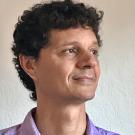
CAMPSSAH builds on the Impact Recruitment Initiative that began with calls for faculty focused on the experiences, contributions, and aspirations of African-American and African Diaspora students and communities. Led by Juan Diego Díaz, Associate Professor of Music and Director of Hemispheric Institute on the Americas, CAMPSSAH works to recruit, integrate and retain faculty who bring multicultural perspectives to the social sciences, humanities and the arts. There are a total of 33 CAMPSSAH Scholars with appointments in 19 departments and four colleges and schools.
Welcome to the new 2025 CAMPOS Faculty Scholars:
Luis Armando Parra, Assistant Professor, Psychology
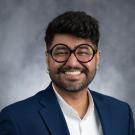
Parra’s research centers on the effects of identity-based discrimination on the identity development, neurobiological stress regulation, and psychological health of lesbian, gay, bisexual, transgender, and queer people of color (LGBTA POC) across adolescence and emerging adulthood. Parra intersects psychological theories of development, oppressive systems, minority health, bioecological systems, and quantitative methodologies. In addition, he builds relationships with community organizations and uses participatory research methods to co-create knowledge with underrepresented communities. Parra was an Assistant Professor in the School of Nursing at the University of Michigan. Parra completed their Ph.D. degree in Human Development at the University of California, Davis in September 2019.
Jeanette Cobian Iñiguez, Assistant Professor, Mechanical and Aerospace Engineering
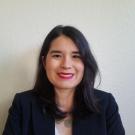
Cobian-Iñiguez's research examines wildfire and wildland-urban interface fire behavior as well as the convergence of wildfires, people, and the environment. She also focuses on heat transfer as well as fire and fluid dynamics of environmental phenomena. She leads a Cross-Border and Bilingual WUI program dedicated to wildfire behavior research across borders and bilingual (Spanish and English) wildfire communications and education. Prior to joining UC Davis, she was an Assistant Professor in the Department of Mechanical Engineering at UC Merced. She completed her Ph.D. at the University of California, Riverside. She holds as B.S. in Mechanical Engineering from UC San Diego and a M.S. in Mechanical Engineering from California State University, Los Angeles.
Breanna Mockler, Assistant Professor, Physics & Astronomy
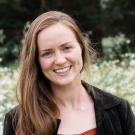
Mockler’s research combines both theoretical and observational astrophysics, specializing in high-energy transient astronomy. She studies tidal disruption events, a phenomenon that occurs when stars orbiting near black holes are destroyed and create a dramatic increase in brightness. These events shed light on the enigmatic properties of black holes in our universe. Mockler grew up in Davis, and earned her B.A. in physics at Cornell and her Ph.D. in Astronomy & Astrophysics at UC Santa Cruz. She was a UCLA Chancellor’s Postdoctoral Research Fellow in 2022. Mockler will join UC Davis in the summer of 2026. Learn more here.
Maxine Umeh Garcia, Assistant Professor, Hematology and Oncology
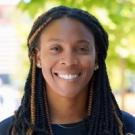
Umeh Garcia studies the mechanisms of brain metastases for triple-negative breast cancer (TNBC), a particularly virulent subtype of this disease. She also looks at the tumor microenvironment through the lens of spatial biology, utilizing cutting-edge techniques. In addition, she is trying to understand the reason for cancer disparities between people of various racial/ethnic categories. One of her main drivers is to break down barriers and support historically excluded and underrepresented students in medicine and academia. Umeh Garcia graduated Ph.D. in Biochemistry Molecular Cell and Developmental Biology from UC Davis and was a postdoctoral scholar at Stanford University.
Welcome to the new 2025 CAMPSSAH Faculty Scholars:
Tye Rush, Assistant Professor, Political Science
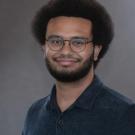
Rush studies the overlap between American political institutions and race/ethnicity, specializing in voting laws in state and local governments. His book projects explore restrictive voting requirements and the political incentives driving legislators to promote voter identification laws. He fills a significant gap in academic literature with his studies of historical discriminatory devices that have implications for voting in the 21st century. Rush is a Ph.D. graduate from UCLA and was a University of California President’s Postdoctoral Fellow (PPFP) at UC San Diego. He has served as a Research Affiliate in the UCSD Voting Rights Project, the UCSD Race and Ethnic Politics Lab, and the Yankelovich Center for Social Science Research; and served as a Postdoctoral Fellow in UCSD’s Black Studies Project. His work also stresses an inclusive methodology with mentoring, teaching, and research. Learn more about him here.
Aamer Ibraheem, Assistant Professor, Anthropology
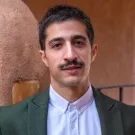
Ibraheem is a sociocultural anthropologist whose research integrates anthropology with history in multiple languages, such as Arabic, Hebrew, and French. He studies the formation of political attachments and the creation of historical claims among mountain communities in the modern Middle East, concentrating on topics of war, self, and theology. He seeks to understand the colonial registers of tradition and their temporal modes of subjection. Ibraheem’s valuable work fills a need for complex, historical, anthropological scholarship in areas rarely studied, such as the Golan Heights, which has profound impacts on the present. Ibraheem received his PhD in Anthropology from Columbia University. In addition, he was the Paloheimo Fellow at the School for Advanced Research in Santa Fe. Ibraheem will be joining UC Davis in the summer of 2026.
Athia Choudhury, Assistant Professor, Asian American Studies

Athia specializes in Asian American/Third World Feminisms and Postcolonial Theory with emphasis on 20th-century body politics and militarized food cultures. She pinpoints the relationship between nation, desire, and the science of health from a decolonial fat studies and disability studies lens. Her work interrogates how wellness and diet culture become major ideological exports of the U.S., whose nutritional and medical decisions become racially coded and gendered during the American century. Athia previously was a Postdoctoral Associate at Duke University and a Mellon Postdoctoral Fellow in Disability Studies at Brown University. She holds a Ph.D. in American Studies and Ethnicity from the University of Southern California. She has taught courses on race, gender, sexuality, and the body as well as facilitated public workshops on race, identity, and belonging at various institutions. Learn more about her here.
Brittani R. Orona, Assistant Professor, Native American Studies
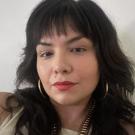
Orona's research and teaching focus on California Indian history and human rights, Indigenous science and technology studies, and environmental studies. She focuses on Indigenous environmental justice, visual sovereignty, and water rights on the Klamath River Basin in Northwestern California. Her work addresses how environmental policy on the Basin relies on narrow definitions of genocide, time, and settler-colonial concepts of ownership to continue Indigenous land dispossession. Prior to joining academia, Orona worked for over ten federal, local, and state government agencies. She currently serves on the Council of Leadership for the California Indian Studies and Scholars Association (CISSA) and on the University of California Systemwide Repatriation Committee. She was a Postdoctoral Fellow at UC Santa Cruz and an Assistant Professor of American Indian Studies at San Diego State University. Orona earned her Ph.D. in Native American Studies from University of California, Davis, an M.A. in Native American Studies from UC Davis, an M.A. in Public History from Sacramento State University, and her B.A. in History from Cal Poly Humboldt. Learn more here.
Stephanie Lumsden, Assistant Professor, Native American Studies
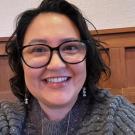
Lumsden's research and teaching focus on California Indian studies, Native feminisms, and abolition. Stephanie currently serves on the California Indian Studies and Scholars Association (CISSA) Council of Leadership. Her research examines the relationship between Indigenous dispossession and the development of the carceral settler state in northwestern California. Lumsden is a member of the Hoopa Valley Tribe. She was a University of California Presidential Postdoctoral Fellow in the History department at UC Santa Cruz and earned her PhD in Gender Studies at UCLA in 2023 with a dissertation entitled Policing, Incarceration, and Dispossession: California Indians and Carceral Statecraft. Lumsden’s scholarship pushes our understanding of California Indian Studies, Gender Studies, and Critical Race Theory. Learn more here.
